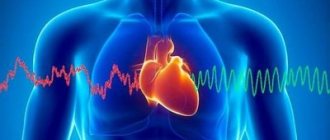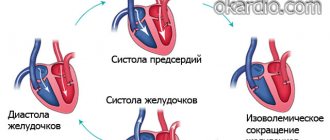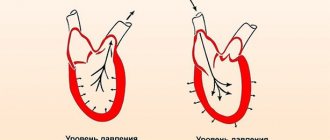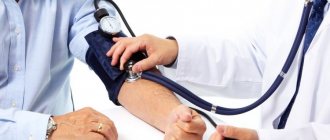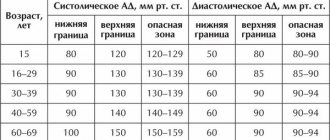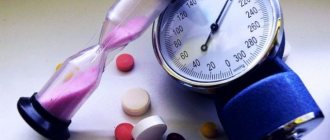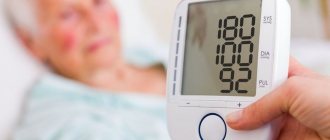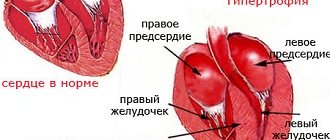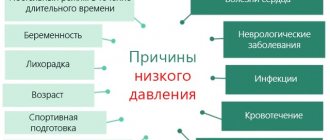19.02.2020
Arterial hypertension or hypertension is a common cardiovascular disease characterized by high blood pressure. Every fifth adult and almost every second elderly person faces a similar diagnosis. Many people think, well, I have high blood pressure, if I have a headache, I’ll take a pill. But the problem is that hypertension is fraught with serious consequences, including heart failure, heart attack or stroke. That is why the disease must be kept under control.
Why is hypertension dangerous?
The heart pumps blood through the blood vessels, providing all the body's cells with oxygen and nutrients. When blood vessels become clogged or lose their elasticity, the heart begins to work harder and increases the pressure inside the vessels.
Against the background of the disease, if not treated in a timely manner, serious pathologies such as acute heart failure, hypertensive crisis, stroke, and myocardial infarction can occur.
The difficulty of hypertension is that it often remains virtually asymptomatic for years and the person does not know about the existence of the disease. Symptoms are often observed - headache, fatigue, memory loss, dizziness, high blood pressure, to which a person simply does not pay attention. This may indicate the beginning of the development of the disease.
Drug treatment
If the measures described above do not help, then doctors recommend taking antihypertensive medications. They are selected exclusively by the attending physician, taking into account various individual factors. Taking medications is not one-time or even a course, but permanent. Therefore, it is important that specific drugs are not only effective (this requires constant monitoring of blood pressure), but also do not lose their effect over time and do not cause adverse reactions.
But often patients do not resort to treatment immediately, but only after a hypertensive crisis, pre-infarction condition or other life-threatening complications of hypertension. It’s better to do differently and engage in prevention.
Guskov Bogdan Valerievich
Cardiologist, Therapist
- On Lukyanovskaya, st. Kudryavskaya, 31/33
Cost of admission: 450 UAH.
Make an appointment
Management of patients in inpatient and outpatient settings of the following profiles: cardiological, therapeutic, pulmonological and patients who require resuscitation and intensive care.
Other articles by the author
Heartache. Angina pectoris. What to do and how to avoid risks to life? What the intensive care door is silent about About the maternity hospital, vaccines and evolution What cardiologists do and should do
Contact us or ask a question
Call now
093 810 90 90Make an appointment
Ask a Question
Write
Comments
familyhealth27.03.2020
To understand what causes pressure in a person, it is necessary to consider the illness itself. There are two types of hypertension: hypertensive disease and symptomatic arterial hypertension. The first type is a chronic process, the causes of advanced AT in any case cannot be explained by doctors and doctors. If there is symptomatic hypertension, then doctors indicate that the cause of hypertension in a person can be one of the following: unbalanced food, stress, poor lifestyle, loose teeth, overweight.
leave a comment
Causes of hypertension
- Excess weight. People who are prone to obesity are several times more likely to suffer from heart disease. Also, excess weight causes increased levels of calcium and sodium in the blood, disruption of normal kidney function and diseases of internal organs. This, in turn, is an additional factor for the development of hypertension.
- Arterial sclerosis. Due to the presence of atherosclerotic plaques on the walls of blood vessels, normal blood circulation stops. The heart has to work harder to increase the pressure in the blood vessels.
- Stressful situations. During stress, blood pressure increases due to the release of the hormone adrenaline into the blood. By acting on the heart, adrenaline causes it to beat faster, throwing more blood into the vessels.
- Bad habits. Smoking, drinking alcohol, fatty and heavy foods increase pressure in blood vessels, form vascular spasms and lead to their damage.
- Age. Over the years, a person's heart wears out. The risk of developing hypertension increases with age if you do not pay due attention to your health. It is necessary to undergo preventive examinations and give up bad habits, if any. High blood pressure often develops in people over 35 years of age.
- Genetic predisposition. If first-degree relatives (father, mother, siblings, grandparents) suffer from hypertension, the risk of developing the disease increases.
- Sedentary lifestyle. At a low level of stress, metabolism slows down, the nervous system and other body systems are weakened, and immunity is reduced. The risk of developing hypertension increases by 50%.
What examinations are also prescribed?
In most cases, hypertension is caused precisely by disorders of the blood vessels and heart. In 5-10% of cases, the root cause may be kidney problems, endocrine changes, stress, neurological factors, or even the use of certain supplements and medications. The doctor needs to determine what caused the disease. For this purpose, diagnostics, as a rule, is not limited to simply measuring pressure. Additionally, the following examinations are carried out:
- electrocardiography and echocardiography;
- Ultrasound of the kidneys and other organs of the urinary system;
- Ultrasound of the thyroid gland; computed tomography of the adrenal glands, skull;
- laboratory tests, including urine and blood tests for hormones.
Additionally, consultation with related doctors, including nephrologist, urologist, endocrinologist, neurologist, etc., is recommended.
It is also important to determine the stage and severity of hypertension and the risk of complications. This may require examinations such as:
- stress tests with blood pressure measurement;
- daily blood pressure monitoring;
- fundus examination;
- blood biochemistry for cholesterol, etc.
Types of cardiac hypertension
There are many classifications of the disease, which are based on the patient’s appearance, blood pressure level, causes of increased blood pressure, and the nature of the disease. However, doctors everywhere use a classification based on the severity of the disease.
Hypertension 1st degree
– is also called the preclinical stage. This is the mildest form of hypertension, in which blood pressure reaches 140/90 mmHg. mercury column. Mild headaches, decreased performance, and general fatigue are observed. While the patient is at rest, the pressure normalizes.
Hypertension 2 degrees
– moderate stage, at which the pressure increases to 180/110 mm. rt. Art. formation of atherosclerotic plaques, hypertrophy of the left ventricle of the heart, and increased concentration of creatinine are observed.
Hypertension 3 degrees
– pressure rises to 220/115 mm. rt. Art. in this case, the risk of complications is high. With this degree of development of the pathology, the blood supply to the internal organs is disrupted. Stage 3 disease can manifest itself as renal failure, hemorrhage from the eyes, and blindness.
Doctors say that the consequences of hypertension are more life-threatening than AIDS, cancer and tuberculosis combined. The insidiousness of this disease is that its symptoms are similar to signs of ordinary overwork. Therefore, approximately half of hypertensive patients find out about their disease too late, when it is very difficult to treat it and it is almost impossible to stop the processes of destruction of the body that it has started.
Jumps and jolts
Probably every adult has experienced surges in blood pressure. Usually we attribute them to unfavorable weather conditions, without even suspecting that these are actually harbingers of a dangerous disease - hypertension.
The heart is a kind of pump that pushes blood into the vessels.
Hypertension at the beginning of its development is associated with functional disorders of the activity of certain parts of the brain and autonomic nodes, which regulate the heart rate, the volume of blood expelled with each contraction, the lumen of blood vessels and their elasticity.
Doctors say that at this stage, the changes occurring in the body are still reversible if a person who notices high blood pressure consults a doctor.
Our blood pressure level is indicated by two numbers.
- The upper one, which is called systolic pressure , depends directly on the force with which the heart pushes blood into the vessels.
- And the lower one, which is called diastolic pressure , is determined by the elasticity of the walls of blood vessels and how firmly they hold the moving blood flow.
Danger signs
The danger of arterial hypertension is that it begins as a dysfunction of blood pressure regulation, but in the future it can lead to many serious diseases of internal organs and systems, as well as dangerous cardiovascular diseases.
Hypertension occurring without medical control can lead to:
- to a heart attack,
- heart enlargement
- and ultimately to heart failure.
Blood vessels may develop dilations or aneurysms that become vulnerable and often develop blockages.
As a result of increased pressure in the blood vessels, there is a risk of cerebral hemorrhage and stroke.
Hypertension can lead to:
- to renal failure,
- blindness
- and various cognitive impairments - decreased memory, intelligence and performance.
The consequences of hypertension are especially dangerous for those who have harmful factors added to the deadly effect on the body of high blood pressure -
- smoking,
- drinking alcohol,
- unhealthy diet,
- sedentary lifestyle,
- frequent stress,
- excess weight,
- very high cholesterol levels in the body
- and diabetes mellitus.
These people have an increased risk of heart attack, stroke, and kidney failure.
Live healthily
In order to prevent the development of hypertension and identify it at the initial stage, it is necessary to constantly keep blood pressure under control. And at the first alarm call, consult a doctor.
At the initial stage, you should not be afraid of the diagnosis of hypertension.
After all, some people just need to change their lifestyle and get rid of bad habits to normalize their blood pressure -
- quit smoking, alcohol,
- and sometimes even giving up salty foods and a diet that involves getting rid of extra pounds helps.
Since those who, in addition to hypertension, also have diabetes, are at particular risk, it is advisable for people suffering from these two diseases, in addition to constantly monitoring their blood pressure, to regularly check their blood sugar levels. After all, if such a combination of diagnoses becomes chronic, the risk of heart attack and stroke increases many times.
But still, it is better to prevent a disease than to treat it later.
And to minimize the risk, doctors give five useful tips:
- healthy eating - give up fast food, consume less than 5 g of salt per day (less than a teaspoon), eat five servings of fruit daily, reduce consumption of fats, especially unhealthy saturated fats;
- give up alcohol and smoking;
- increase your activity and exercise at least 30 minutes a day;
- get rid of extra pounds and control your weight, because losing excess body weight helps lower blood pressure;
- Try to have a positive attitude towards life and avoid stress.
By the way
- Normal blood pressure in adults is determined by levels of 120 mmHg when the heart contracts (systolic) and 80 mmHg when it relaxes (diastolic). It is considered elevated when the upper figure exceeds 140 and the lower figure exceeds 90 mm.
- In some parts of the modern world where there is almost no urbanization - in the settlements of the Australian aborigines, New Guinea and some Pacific islands - there are almost no patients with hypertension.
- Overweight people suffer from hypertension 3-4 times more often than those who are not overweight.
Source: https://www.aif.ua/
Cardiovascular diseases
2015 is the year of the fight against cardiovascular diseases.
In his annual Address to the Federal Assembly, Vladimir Putin stated, “this year (2014) ...
Arterial hypertension - basic concepts
High blood pressure, or hypertension, is considered the most common ser…
Sick heart: hidden signs
We are well aware of the signs of a heart attack: pain or pressure behind the sternum, shortness of breath, impaired r...
Stroke. Microstroke
A stroke, or as it was previously called, a brain stroke, is caused by a sudden cessation of blood supply...
How to recognize a stroke in time
Video Lesson. Signs of a stroke and first aid 3-6 hours. This is the time from the moment the first symptoms appear...
WHO. Prevention of heart attacks and strokes
Causes and conditions of heart attacks and strokes. What are the signs of heart attack and stroke and what...
Stop thrombosis, save lives
THROMBOSIS is the formation of a blood clot in an artery or vein; this is the same pathology that...
20 facts about the human heart
The human heart is a cone-shaped hollow muscular organ that receives blood from the...
Urgent self-help and mutual aid measures
In our country, up to 80% of deaths occur outside of medical organizations - at home, at work, in the countryside...
Risk factors for stroke. Should know this...
A stroke requires a lot of courage from the patient and a lot of patience and love from his loved ones. Because …
Stroke. The result is worth the effort
Sometimes the disorders caused by a stroke go away quickly, and after some time the person returns...
Stroke. The diagnosis will be made by a doctor
Currently, there are many basic and additional methods that allow you to deliver…
First aid for a heart attack (myocardial infarction)
Heart attack is one of the common causes of sudden death. No one is immune from it...
Cholesterol: what is it?
High cholesterol is a dangerous signal. Cholesterol is present in all tissues of the human body...
Prevention of hypertension
Preventing hypertension is a top priority for many people. Especially the act...
Hypertension is an epidemic of the 21st century. Questions and answers…
Hypertension, also known as high blood pressure, is a condition in which the blood...
October 29 is World Stroke Day...
Every year on October 29, the world celebrates World Stroke Day, which…
Pain in the heart area
Perhaps most people have experienced pain or other unpleasant sensations due to pain at least once in their lives...
Stroke. VIDEO
Heart attack. VIDEO
How to diagnose the disease?
When the first symptoms of hypertension appear, consult a cardiologist. He will conduct an examination and refer you for tests:
- general blood and urine analysis;
- blood test for hemoglobin;
- urine test for protein and glucose;
- electrocardiography;
- echocardiography;
- chest x-ray;
- biochemical blood test to detect cholesterol, urea, glucose and calcium levels;
- phosphates and uric acid;
- CT scan;
- ultrasonography.
Based on the results of the tests, the attending physician will determine whether hypertension is present, the stability of the increase in pressure, the degree of development of pathological changes in the internal organs, and the cause of the increased pressure.
Treatment of hypertension
The method of treatment depends on the degree of development of the disease. In the first preclinical stage, normal blood pressure levels can be maintained without the use of medications. The patient needs to balance their diet, give up bad habits, lead an active lifestyle and normalize their sleep and work patterns.
When treating stage 2 hypertension, the doctor prescribes a medication for long-term use and with a minimum number of contraindications, combined with moderate activity and giving up bad habits. The drug is prescribed by a cardiologist after examining the patient. The drugs must be taken continuously as this can cause a stroke or heart attack.
Therapy of stage 3 hypertension is carried out with the help of 1-2 drugs from different drug groups in combination with an active lifestyle and stabilization of nutrition and sleep patterns.
- diuretics with a diuretic effect are prescribed for salt and water retention in the body;
- to normalize blood circulation - ACE inhibitors;
- calcium antagonists - to reduce the oxygen demand of the heart muscle;
- beta blockers for atrial fibrillation or other concomitant pathologies.
Therefore, when determining therapeutic therapy, the doctor must know the patient’s entire medical history, take into account contraindications, lifestyle and physical characteristics (body weight, height).
Hypertension is treated in Krasnoyarsk at the medical level. We have experienced cardiologists who will conduct a complete examination and examination, friendly medical staff and high-quality equipment. To make an appointment with a specialist or find out more detailed information, leave a request on the website or by calling the clinic 201-03-03.
Treatment without drugs
Bad habits and some features of modern lifestyle increase the risk of developing hypertension:
- smoking. One cigarette smoked causes an increase in blood pressure for half an hour, also increasing the heart rate. And the constant presence of nicotine in the blood leads to a persistent increase in blood pressure;
- overweight and high blood cholesterol;
- low level of physical activity;
- increased blood glucose levels can be caused by excessive consumption of sweets, fast food, etc.
If you normalize your lifestyle and diet, lose weight, and give up harmful habits, then your blood pressure can return to normal.
